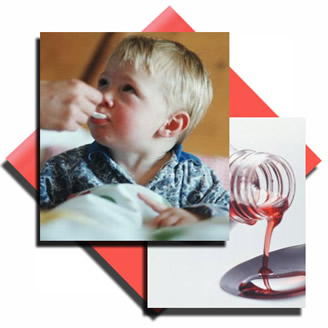COLD MEDICATIONS WARNING |
||
...........Small Kids are in Real danger with Cough and Cold Medications There is no doubt that administering medications properly can help you feel better and Being cold season, it is not rare for us to try to get the best medications, which sometimes we can erroneously think are the strongest or most expensive ones, when the benefits of a medicine actually depend on the individual case and the medication’s formula. This is why someone else’s advice on what worked for them or what they think they know can’t be a substitute for a doctor’s visit or the advice of a health professional. Use of cough syrups in excess to calm coughs has claimed lives “Cough and cold medications can be harmful, even fatal, and should be used with caution on children less than two years old,” recommended Dr. Adam Cohen, study author and officer for the Epidemic Intelligence Service of the U.S. Centers for Disease Control and Prevention. “They’re medications, which is why they have both risks and benefits.” A study by the U.S. government indicates that over-the-counter cough and cold medications can be harmful and even deadly for smaller children. The report is in the January 12, 2007 edition of the CDC’s Morbidity and Mortality Weekly Report. This report mentions that, as a result of errors in cold medication dosages, 1,500 small children were treated in the emergency room and three babies under 6 months of age died. These data were taken from the 2005 database. In addition, between 2004 and 2005, more than 1,500 children under 2 years of age received treatment in the emergency room for problems related to taking cold medications. The U.S. Food and Drug Administration only approved the use of over-the-counter cough and cold medications for children older than two years of age. For children less than two years old, the recommended dosage by the pediatrician should be used, given it is difficult to provide a rule for the appropriate dosage without taking into account the seriousness of the case and the infant’s state. “It has never been demonstrated that cough and cold medications, especially all those containing pseudoephedrine (a nasal decongestant), have a beneficial effect on children less than 2 years of age, although they clearly have significant harmful effects,” stated Dr. Michael Marcus, Director of Pediatric Pulmonary Medicine at Maimonides Infants & Children’s Hospital of Brooklyn in New York. “There are no studies supporting the use of cold medications on babies,” said Dr. Gwen Wurm, Director of Division of Community Pediatrics in the Miller School of Medicine at the University of Miami. “What we have to keep in mind is that colds go away. Kids could benefit from having a humidifier close to their bed and saline solution nose drops, although this type of loving care is what most children need.” Several groups of professionals, including the American Academy of Pediatrics and the American College of Chest Physicians have issued guidelines that recommend caution when using these medications on small children. The FDA took measures to control and suspend the use of medications containing carbinoxamine (an antihistamine erroneously labeled for use on babies and small children that could still be found at some establishments) and banned the sale of products containing pseudoepinephrine (for its methamphetamine content) without a medical prescription. Even so, there continue to exist products that could be harmful to small children which is why CDC and National Association of Medical Examiners (NAME) officials, who researched the death of three babies, one of whom was between one and six months old, found dead in their homes in 2006, advice using caution. “Parents should absolutely avoid these medications unless they are supervised by a physician,” said Marcus. “Parents should realize that over-the-counter medications could contain products similar to the medications that the pediatrician is also prescribing, which is why they should let him know of all the medications the child is taking when talking about a new treatment.” “Parents should never administer medications, including over-the-counter medications, without consulting a health professional,” added Cohen. “Many over-the-counter medications could be advertised as products for babies even though they do not have the dosages recommended by the FDA for this age group.” |
||
About Us | Privacy Policy | Disclaimer | Contact Us TEL- 619-427-4111 - Health@infooption.com Salud+HealthInfo is for information and educational purposes only. You should not rely on this information as a substitute for personal medical attention, diagnosis or hands-on treatment. If you are concerned abut your health or that of a child, please consult your family's physician or health provider immediately and do not try and diagnose yourself. Copyright © 2001-2008 Info Option Network |
||
Bienvenido a la primer revista dedicada al cuidado de la salud
 info
info
The first, the best & the only English & Spanish Magazine in San Diego, California

 get better sooner. But all medications imply some risk, which is why you should always check with your doctor or pharmacist when you taking a medication for the first time, or when you are looking for something among the large number of over-the-counter medications available out of a need to feel better or make one of your loved ones feel better.
get better sooner. But all medications imply some risk, which is why you should always check with your doctor or pharmacist when you taking a medication for the first time, or when you are looking for something among the large number of over-the-counter medications available out of a need to feel better or make one of your loved ones feel better.